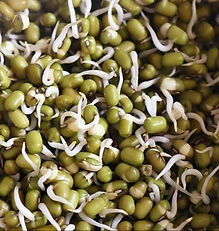
Microgreens

Microgreens are the young, tender leaves of plants harvested just after the first true leaves (cotyledons) have emerged. Think of them as baby plants on a mission to deliver maximum flavor and nutrients in a bite-sized form. From the spicy tang of arugula to the mild sweetness of pea shoots, microgreens are a flavor explosion in every bite. Not only do they pack a serious punch in terms of vitamins and antioxidants—sometimes up to 40 times more than mature vegetables—but they’re also incredibly versatile.
Here’s a breakdown of some key benefits:
1. Nutrient Powerhouses Microgreens are packed with nutrients—sometimes more so than their fully mature counterparts. They’re loaded with vitamins (like A, C, E, and K), minerals (like potassium and magnesium), and antioxidants, which are all essential for supporting overall health. Some studies have shown that certain microgreens contain up to 40 times more vitamins and nutrients than the full-grown plants! 2. Boost Immune Health Because of their high concentration of vitamins and antioxidants, microgreens can help strengthen your immune system. The antioxidants, in particular, help fight free radicals in the body, which are responsible for oxidative stress and damage. This makes them an excellent addition to any diet aiming to combat aging and chronic diseases. 3. Rich in Fiber Microgreens, especially those like pea shoots and radish greens, are rich in fiber. Fiber aids in digestion, supports a healthy gut, and can help manage blood sugar levels. Regularly incorporating microgreens into your meals can contribute to better overall digestive health. 4. Easy to Grow One of the best things about microgreens is how easy they are to grow, even for beginners. They don’t require a lot of space, soil, or sunlight, making them perfect for indoor gardening or small spaces like apartments. Plus, they grow quickly—often ready to harvest in just 7 to 21 days. This makes them a great option for urban gardeners or anyone wanting fresh greens year-round. 5. Enhance Flavor and Variety Microgreens add a burst of flavor and color to any dish. Whether it's the spicy kick of mustard greens or the fresh, mild taste of sunflower shoots, they can elevate the flavor profile of salads, sandwiches, smoothies, and more. Their vibrant hues and delicate textures also make them an attractive garnish or topping for any meal. 6. Low in Calories Microgreens are incredibly low in calories, yet packed with nutrients, making them an excellent choice for anyone looking to manage their weight. They provide a nutrient-dense snack or meal addition without the added calories or fat of more processed foods. 7. Sustainable and Eco-Friendly Growing microgreens is a sustainable option for those who care about the environment. They require minimal water, space, and resources compared to larger crops, making them an eco-friendly option for reducing your carbon footprint. Growing them at home can also reduce the need for plastic packaging often associated with store-bought greens. 8. Support Heart Health Many varieties of microgreens, such as red cabbage and sunflower microgreens, contain compounds that are believed to promote cardiovascular health. These greens have been linked to lower cholesterol and improved circulation, contributing to a healthier heart. 9. Help Detox the Body Certain microgreens, like cilantro, are known for their detoxifying properties. Cilantro, in particular, has been shown to help remove heavy metals from the body, aiding in the detox process. Including detox-friendly microgreens in your diet can support your body’s natural cleansing mechanisms.

Sprouts
Sprouts, on the other hand, are the baby versions of seeds before they’ve developed their leaves. Sprouts are harvested when the seed begins to germinate, usually after just a few days of soaking and sprouting. They’re incredibly nutrient-dense, containing concentrated amounts of vitamins and enzymes that support digestion and overall health. Think of alfalfa sprouts, broccoli sprouts, or radish sprouts—delicate, crunchy, and packed with fresh, earthy flavors.
Here’s a closer look at some of the top advantages of adding sprouts to your meals:
1. Nutrient-Rich Sprouts are loaded with vitamins, minerals, and enzymes that are highly bioavailable, meaning your body can absorb and use them more easily. Some of the most common nutrients found in sprouts include vitamin C, vitamin A, B-vitamins, iron, calcium, magnesium, and potassium. Because they’re harvested at the germination stage, sprouts contain concentrated amounts of these nutrients, sometimes in higher quantities than the mature form of the plant. 2. Digestive Health Support One of the most significant benefits of sprouts is their support for digestive health. When seeds germinate, they release enzymes that make the nutrients easier to digest and absorb. Additionally, sprouts are high in fiber, which aids in healthy bowel movements and promotes a healthy gut microbiome. The enzymes in sprouts can also help improve digestion by breaking down proteins and fats, reducing bloating and discomfort. 3. Rich in Antioxidants Sprouts are packed with antioxidants, compounds that help protect the body from oxidative stress and free radical damage. Antioxidants found in sprouts, such as flavonoids and carotenoids, play a critical role in fighting inflammation, reducing the risk of chronic diseases, and promoting overall health. Certain sprouts, like broccoli and alfalfa, are particularly known for their antioxidant properties. 4. Boost Immune System Thanks to their high content of vitamins, minerals, and antioxidants, sprouts can help strengthen your immune system. Vitamin C, for example, is a powerful immune-boosting nutrient found in high concentrations in many types of sprouts. Including sprouts like broccoli or radish in your diet can help support your body’s defense mechanisms, making it more resilient to infections and illnesses. 5. Detoxification Certain types of sprouts, such as mung bean sprouts or alfalfa sprouts, contain compounds that support the body’s natural detoxification processes. These sprouts help eliminate toxins, improve liver function, and reduce the burden of heavy metals in the body. Regular consumption of detoxifying sprouts can contribute to clearer skin, better liver health, and an overall feeling of vitality. 6. Heart Health Many sprouts, such as broccoli sprouts and lentil sprouts, are heart-healthy foods. They are rich in fiber and contain compounds like sulforaphane (found in broccoli sprouts) that have been shown to improve blood vessel function, reduce cholesterol levels, and support overall cardiovascular health. Sprouts can also help regulate blood pressure and reduce inflammation, which is critical for heart health. 7. Low-Calorie and Filling Sprouts are low in calories, making them a great option for anyone looking to manage their weight while still consuming nutrient-dense foods. Despite their low calorie count, sprouts are high in fiber, which promotes satiety and helps you feel full for longer. This makes them an excellent addition to meals for weight control without sacrificing nutritional value. 8. Easy to Grow and Sustainable Like microgreens, sprouts are incredibly easy to grow, even for beginners. They require minimal space, soil, and sunlight, and you can grow them in just a few days with simple ingredients: seeds, water, and a jar or sprouting tray. Growing your own sprouts at home is a sustainable way to enjoy fresh, organic, and nutritious food without relying on store-bought options that may be wrapped in plastic. 9. Improved Blood Sugar Control Sprouts, particularly those made from legumes like lentils and chickpeas, have a low glycemic index and are high in fiber and protein, making them a great choice for stabilizing blood sugar levels. The slow digestion of fiber-rich sprouts helps prevent blood sugar spikes, making them an ideal addition to the diet for people with diabetes or those looking to maintain steady energy levels throughout the day. 10. Supports Skin Health The vitamins and antioxidants in sprouts, particularly vitamin C, play a vital role in collagen production and skin health. By reducing oxidative stress and promoting detoxification, sprouts help maintain healthy, youthful-looking skin. Consuming sprouts regularly can also help combat acne and other skin conditions due to their anti-inflammatory properties. 11. A Natural Source of Plant Protein Sprouts are an excellent source of plant-based protein, especially varieties like mung beans, lentils, and chickpeas. This makes them a great option for vegans, vegetarians, or anyone looking to increase their protein intake without relying on animal products. Protein is essential for muscle growth, repair, and overall body function, and sprouts provide it in an easily digestible form.
